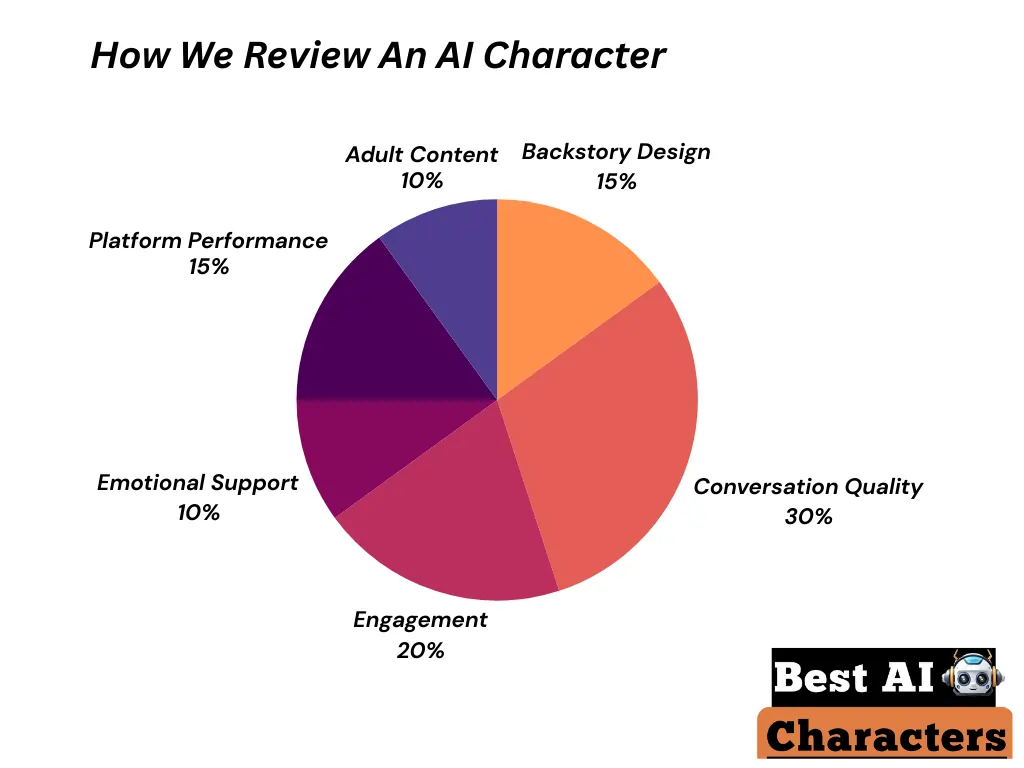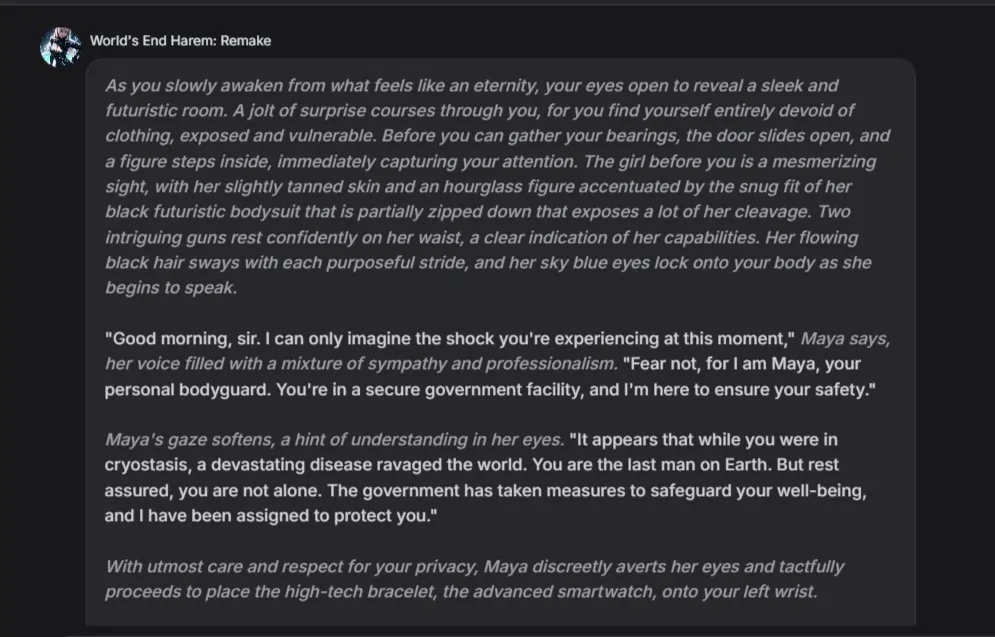The Best AI Characters team has spent tons of time chatting with AI roleplay users (Including My friends and me, of course 😁) to figure out the biggest problems they run into with AI characters. We've created scoring guidelines based on what they told us, making it easier for you to spot which AI characters are great and which ones might not be so good.
Check out our scores to quickly find the AI character that works best for you. Below, we'll break things down factor by factor so you can see how we test and score AI characters.
Scoring Factors
Our overall score is based on a weighted average of 6 scoring factors.

How Do We Rate Each AI Character?
We give each feature a rating based on how important it is. Then, we add up these ratings to get the overall score. The more points an AI character gets for each feature, the better its overall score will be.
Here's what each overall score means:
4.6 to 5.0😊
This is the best score. It means the AI character is excellent with great features.
4.0 to 4.5🙂
This is a good score. The AI character does what it needs to do, but it's not perfect.
3.0 to 3.9😔
This is a bad score. The AI character doesn't do as well as others in its group.
We rate each feature using a system from 3.0 to 5.0, with steps of 0.5. The total score can have decimal points.
Our Scoring Methodology
As time goes by, we might find better ways to test things or change what we look for. We do this to make sure our ratings give you good advice about AI characters.
Right now, our way of evaluating AI characters comes from talking to people who make AI characters and fans who use them. We asked them what features are most important and what problems they face.
If we change how we rate AI characters, we'll update our old reviews, too. We'll always tell you which method we used to rate an AI character at the start of each review.
Backstory – 15%
The backstory is an important part of an AI character's rating, making up 15% of the total score. It focuses on how well the character's history, personality, and motivations are explained. A strong backstory helps users connect with the character and understand their actions and decisions.

Here’s how we rate backstories:
4.6 to 5.0
Excellent backstory with rich details, clear personality traits, and a strong connection to the character's history.
4.0 to 4.5
Good backstory with enough detail but could use more depth or clarity.
3.0 to 3.9
Basic or unclear backstory with minimal effort or missing important details
Character Depth – 7.50%
Character depth is about how much thought has gone into defining the character’s traits, motivations, and goals. This makes up 7.5% of the total score. A well-developed character feels real and relatable.
We evaluate:
Profile Match – 7.50%
The profile match checks if the AI character’s appearance and description align with their role in roleplay scenarios. This also contributes 7.5% to the overall score.
We look at:
Conversation Quality – 30%

We check how well an AI character talks by looking at how it responds to messages. This makes the roleplay feel real and fun. We look at several important things:
Opening Message (10%)
The first message is crucial. It should:

Gender (10%)

A good AI should work for both men and women. It should not use language that is specific to one gender unless the user asks for it.
💌Chat Stamina (10%)
We check if the AI can keep talking without breaking down. We send 100 messages to see how long it stays good.
Conversation Score Scale:
We rate conversation quality from 3.0 to 5.0:
4.6 to 5.0
Excellent. The first message is great, and responses stay good for 40+ messages.
4.0 to 4.5
Good. The first message is good, and responses stay engaging for 30-40 messages with minor issues.
3.0 to 3.9
Poor. The first message is average, and responses work for 15-30 messages but might get repetitive.
Engagement 20%
Engagement shows how well an AI character interacts with users. We calculate it by dividing the total messages by the total chats. This tells us how much users interact with the character on average.

Engagement Levels
Here's what each level means:
Engagement Score Scale
We rate engagement from 3.0 to 5.0. Here's what each score means:
4.6 to 5.0
Excellent. Users are very engaged (40+ messages).
4.0 to 4.5
Good. Users are engaged (30-40 messages).
3.0 to 3.9
Decent. Needs improvement (15-30 messages).
Emotional Support – 10%

We evaluate how well an AI character provides emotional support by checking if it can respond in a caring, understanding, and empathetic way. This is especially important for users who seek comfort or advice from the AI. Here are the key factors we consider:
Empathy – 3%
A good AI character should:
Active Listening – 2%
The AI should show that it is paying attention to what the user is saying by:
Consistency in Tone – 3%
The AI must maintain a supportive tone throughout the conversation:
Chat Stamina for Emotional Support – 2%

We also test how long the AI can stay emotionally supportive without losing quality. Similar to general chat stamina, we send 100 messages focused on emotional topics to see how well it performs:
Emotional Support Score Scale🤗
We rate emotional support from 3.0 to 5.0:
4.6 to 5.0
Excellent emotional support. The AI is highly empathetic, listens actively, and maintains a caring tone for 40+ messages.
4.0 to 4.5
Good emotional support. The AI is mostly empathetic and supportive for 30–40 minor-issue messages.
3.0 to 3.9
Decent emotional support. The AI shows some empathy but may give repetitive or less personalized responses after 15–30 messages.
Adult Content (10%)
We evaluate adult content features in AI characters based on the following key aspects:
- Image Generation – 3%
We check if the AI can create or share explicit images during chats. Some platforms allow users to generate detailed, uncensored images based on prompts, offering customization for personal preferences.
We evaluate the quality of generated images, ensuring they match user prompts accurately and enhance the interactive experience.
- AI Sexting Depth – 4%
We assess how realistic and personalized the sexting experience is. Advanced platforms use natural language processing to create intimate, context-aware conversations that adapt to user preferences.
We also check if users can tailor interactions to match their desired tone or scenarios, making the experience more immersive.
- Voice Notes & Media – 3%
We test if the platform offers erotic voice notes using realistic AI-generated voices. These notes should sound natural and engaging for a more immersive experience.
We also check for multimedia options like syncing with external devices or generating custom audio content. Additionally, we look for special gallery features or any unique adult-oriented functionalities that enhance the overall experience.
Scoring Scale
We rate adult content features using a 3.0 to 5.0 scale in 0.5 increments:
- 4.6 to 5.0: Excellent. Offers advanced image generation, deeply engaging sexting, and high-quality voice notes or multimedia.
- 4.0 to 4.5: Good. Provides solid features with some customization but may lack depth in certain areas.
- 3.0 to 3.9: Decent. Basic features with limited customization or lower-quality interactions.
Platform – 10%
We also review the platform where the AI character is hosted. Even the best AI depends on how good the platform is. We check these key areas:
- Memory – 3%
- Speed – 2%
- Customization – 3%
- Privacy – 2%
How We Review AI Platforms
We use a simple “pass or fail” system for scoring. If a platform meets the minimum requirement for each category, it gets full points (2%). For example, if an AI remembers at least 20 messages, it passes and earns 2% for memory.
Memory – 3%

Memory is important because it makes the AI feel personal. We test this by sharing details like our name, hobbies, or preferences and seeing if the AI remembers them in future chats. For example, does it recall your favorite food or past roleplay details? Good memory makes conversations feel real, while poor memory makes the AI seem forgetful.
Passing Grade: Remembers at least 20 messages.
Speed – 2%

Speed affects how smooth the chat feels. We test how quickly the AI responds by sending prompts and timing replies. The ideal response time is within 1–3 seconds. We also test at different times of day to check consistency across devices and internet speeds.
Passing Grade: Replies within 3 seconds max.
Customization – 3%

Customization lets you adjust the AI to your liking. We check if you can change its personality, backstory, or appearance. For example, can you make it more romantic or shy? Is it easy to use these settings? The more flexible the platform is, the better your experience will be.
Passing Grade: Allows customizable responses.
Privacy – 2%

Privacy is crucial when sharing personal information. We check if chats are encrypted, if data is stored or shared, and if users can delete their data or chat anonymously. We read privacy policies to ensure there’s no misuse of your information.
Passing Grade: No chat monitoring
Scoring Scale:
Here’s how we rate platforms:
4.6 to 5.0
Perfect score; excellent features and performance.
4.0–4.5
Good score; meets basic needs but has minor flaws.
3.0–3.9
Poor score; underperforms compared to competitors.
Fixing Mistakes
We work hard to make our reviews accurate, but mistakes can happen (e.g., wrong scores or outdated info). If you spot an error, let us know so we can fix it quickly.

